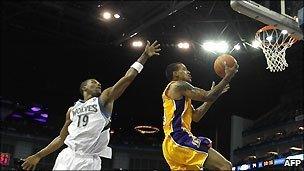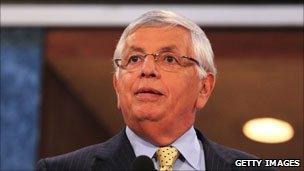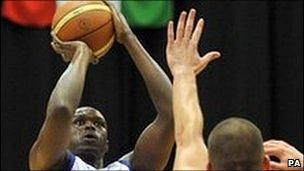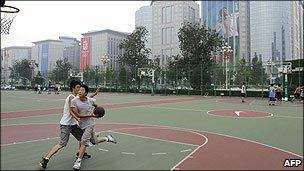Globetrotter Stern selling NBA and basketball
- Published

The London NBA friendly matches will be followed by two regular season games in March 2011
NBA basketball commissioner David Stern is a busy man, on a globetrotting mission to promote and expand the sport and its business.
Last week he was in London for the fourth consecutive annual NBA Europe game, at the 02 Arena, before heading off to Moscow and then on to China for another exhibition game.
The UK game saw the Minnesota Timberwolves beat the LA Lakers, but more importantly for Mr Stern, his sport was given another awareness boost.
"Our latest London game was a spectacular success, another good family event," he says.
"It was amazing to see all those gold Lakers jerseys in the audience, but the Timewolves rose to the challenge."
'Huge opportunity'
Mr Stern says the 2012 Olympics in London can help make basketball as popular in the UK, where football is king, as it is on mainland Europe.

Mr Stern believes the 2012 Olympics can provide a catalyst for basketball in the UK
"It's no secret that the UK trails other European markets in development, but we think this is a great market and participation rates are increasing," he says.
"That's why we have our European headquarters here in London.
"We think the Olympics provides a huge opportunity to demonstrate and promote out sport and to show that it is one of great inclusiveness."
He says the NBA will continue to invest in events that will increase the number of youngsters in the UK playing the game.
The NBA is gradually stepping up its campaign in the UK as the Olympics approach in 2012.
European commitment
The first step will be the first-ever "regular" (ie non-friendly) season NBA games in Europe next spring.
New Jersey and Toronto will take part in a pair of games, on 4 and 5 March, at London's O2 Arena.
"These fixtures show our ongoing commitment to Europe, and particularly the 2012 Olympics in London," says the 68-year-old commissioner.
"As well as having the regular series games in March, we will be celebrating Basketball Week in the UK.
"There will be a series of events for kids and generally through a call to 'basketball for all' - the game is so inclusive and that is something we want to highlight."
He said the London experience to date had been one of great "magnitude" in terms of TV coverage, sponsorship and merchandising.
But he said that, in terms of developing basketball leagues, the UK still had work to do to catch up with the likes of Spain and Italy.
The 2012 Olympic games can, he believes, help in this regard, by bringing more publicity to the sport.
"Of course we will have commercial activities but we want to be focused on legacy events like opening new courts, putting on clinics and so on," he says.
"There are a lot of elite athletes in this country and we want another one in 10 to bounce a ball rather than kick it because that can be huge."
'Inclusive GB team'
Mr Stern is also continuing to lobby in favour of a Great Britain basketball entry into the 2012 Olympics, which world governing body FIBA has yet to confirm.

Players like Great Britain's Luol Deng must wait to see if Team GB is given a 2012 Olympics place
Basketball is the only sport at the Olympics where the host nation is not guaranteed a place, with a decision due in 10 months.
"It would be a tremendous achievement for Team GB to be selected to participate in the London Olympics," says Mr Stern.
"A team could represent all of Britain, have players from England and Scotland and Wales, something that does not occur in football.
"So, it is a very important time, and we are enormously impressed by [2012 Olympics organisers] Locog, and their legacy plans."
On the global picture, Mr Stern, who took over as commissioner in 1984, continues to be impressed.
"More youngsters are playing basketball than ever before, and we are seeing more interest being expressed through leagues, merchandising and sponsorship sales, and increased web traffic - every metric is very positive," he says.
World Cup links
And he points to NBA offices in London, Istanbul, Johannesburg, Madrid, Milan, Moscow and Paris as proof of expanding interest across Europe, and to similar interest in other parts of the world.
"We used the football World Cup in Johannesburg to open an office in South Africa," he says, and continuing the football theme, says that pre-season games will be held in Brazil, "likely prior to the 2014 World Cup".
If that is not possible, then games will be held prior to the Rio 2016 Olympics.
Meanwhile, China remains a most important target for the NBA, with Mr Stern in China to watch the New Jersey Nets v Houston Rockets this week.
An estimated 12% of the urban Chinese population now play basketball and a separate NBA China organisation has been established.
"Europe is, for us, second to China as a potential revenue source, and we shall continue to develop in Europe," he says.
However, a London club franchise or NBA European division remains far away, with the commissioner saying that such a development may be a reality "in a decade or so".
'Mutually assured destruction'
With such a rosy future seemingly on the horizon, there is one potentially dark cloud looming.
The NBA and the basketball Players Association have been in negotiations this year on salaries, contract negotiations, players' percentage of league revenues and other issues.
If the collective bargaining rights, which end after the forthcoming season that starts later this season, are not successfully renewed there is the threat of a potential player "lockout" in 2011.
This could lead to a truncated match schedule, negative publicity and financial losses.

China is the most important non-US market for the NBA
"There is always a danger, but we have got a full season to get it [an agreement] done," says a positive Mr Stern.
"Either that or we engage in mutually-assured-destruction."
Meanwhile, he is too busy to envisage thoughts of retirement.
"I am obviously not going to be in charge forever, but at the moment I have no plans regarding retiring," he says.
"It is certainly not a subject I am considering while we have so many exciting changes envisaged."